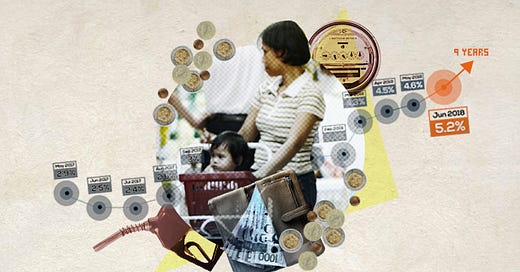Our Sense of Stability is Being Shaken
Rising inflation is triggering new ways of living and relating to the world
Amid an endemic pandemic, new variants and rising inflation, young families are not so confident any longer of putting food on the table.
To understand how hard our wallets are being squeezed, over 12% of Americans aren’t buying during the holidays.
In Canada where even significant subsidies existed during the tough months, nearly four out of five Canadians are either worried or very worried about rising inflation, a new Ipsos poll conducted exclusively for Global News found.
It’s not clear if the CERB/CRB will be revived when the next wave of Covid-19 arrives at our doors. It seems even the help would be minimal. One proposed program Canada Worker Lockdown Benefit would provide $300 a week to eligible workers who are unable to work during the period of October 24, 2021 and May 7, 2022 due to a public health lockdown imposed by government.
The Canada Recovery Benefit (CRB) ended on October 23, 2021. All over the world housing moratoriums have ended and the lower middle class and lower class are really suffering even after quitting jobs to pivot their careers.
Inflation doesn’t seem to be very transitory for the bottom 40%. In the U.S. renters are still protected from evictions in certain states. The pent up demand and discretionary spending we used to have during the pandemic, is gone. The problem is the rising inflation, where gas, food and other consumer goods and commodities are rising extensively. Given how many people live paycheck to paycheck, it’s catch up with us and we’re losing our decent common sense of stability that we will be able to make ends meet.
In the U.S. groups representing landlords had been lobbying hard to end the moratorium and now warn even another month will put some of those landlords out of business. Most renters in New Jersey and New York can’t be evicted until January. New Mexico has also prohibited renters from being pushed out of their homes, and hasn’t yet specified when the protection will end. But if you live in the wrong state, you haven’t been as lucky.
The entire world is connected. Inflation is a global macro event. China’s economy continued to slow in November with car and home sales dropping again as the property market crisis dragged on. Gas and food prices increasing is now common in many parts of the world. The story of the Middle class being dragged down into the lower-middle class however is not being told.
Migration from the EU to the U.K. went into reverse for the first time since 1991 last year. Meanwhile Germany’s pandemic situation could adversely impact its economic growth. The U.S. is five months behind typically what happens in Europe so the 2022 pandemic could burst the equity bubble along with the Fed raising rates. Goldman Sachs expects the Fed to tighten policy faster than previously anticipated next year amid rising inflationary pressures.
Brazil’s consumer prices rose higher than expected, adding to signs inflationary pressures are widespread despite aggressive rate hikes. Supply-chain issues could even worsen realistically, as the shortage of ICU nurses in 2022. Part of living off the grid means that our entire lifestyle needs to be rethought during times of collective crisis. Perhaps you are feeling that too?
With 11.5% of Americans who aren’t buying any gifts this holiday season (2021), according to a survey by Deloitte it also shows a shift away from consumeristic tendencies with more wild-card environmental events and geopolitical tensions rising, we need to begin to build a new world that’s not based on the profit-motive or economic considerations alone. Our sense of stability is also rooted in ideology and trust in things like Government, Capitalism and that we will be okay in the current system.
When minimalism, living off the grid, eco-living and supporting each other in a less individualistic society become more important - it’s a matter of survival and necessity and not just an escape from reality. Those utopian ideals and environmental activism and Millennial minimalism become part of a collective reaction against our social and global dysfunction in a fractured world.




